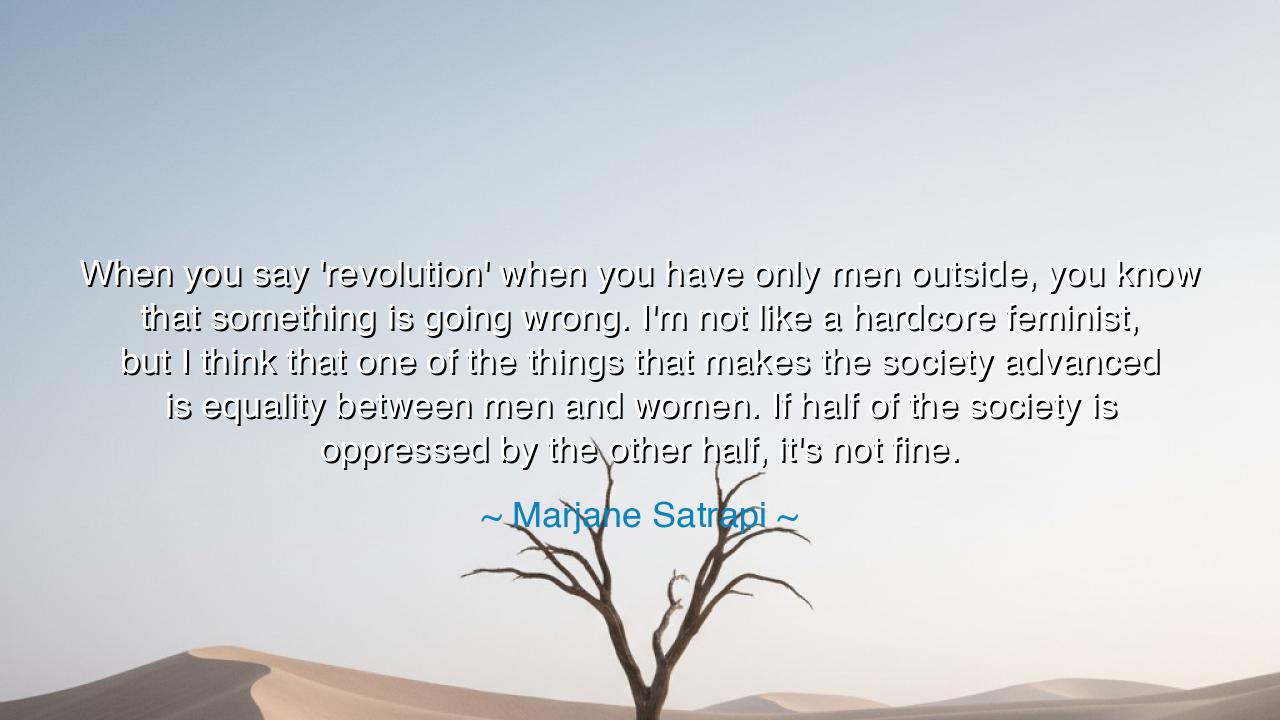
When you say 'revolution' when you have only men outside, you
When you say 'revolution' when you have only men outside, you know that something is going wrong. I'm not like a hardcore feminist, but I think that one of the things that makes the society advanced is equality between men and women. If half of the society is oppressed by the other half, it's not fine.






The words of Marjane Satrapi, fierce and wise, burn like fire beneath calm ashes: “When you say ‘revolution’ when you have only men outside, you know that something is going wrong. I’m not like a hardcore feminist, but I think that one of the things that makes the society advanced is equality between men and women. If half of the society is oppressed by the other half, it’s not fine.”
This utterance is not merely a reflection on gender — it is a lament for the betrayal of revolution, a mourning for promises unfulfilled. For what is a revolution if it frees the body but enslaves the soul? And what is liberty if half the human race still walks in chains?
In these words lies a warning to every age that has dreamed of change. Many have cried out for justice and lifted banners to the sky, yet when the hour came, they forgot the mothers who raised them, the sisters who stood beside them, the daughters who waited in silence. Satrapi, who lived through the Iranian Revolution of 1979, saw the streets flood with the voices of men demanding liberty — only for those same voices to echo laws that silenced women anew. She knew the bitter irony: a revolution that excludes the feminine is not a rebirth but a relapse into tyranny.
The ancients spoke of balance — yin and yang, sun and moon, earth and sky — for harmony is born when opposites unite, not when one dominates. Likewise, society must walk on two legs, man and woman, equal in strength though different in form. When one leg is bound, the body limps; when one wing is clipped, the bird cannot rise. This is the essence of Satrapi’s truth: no nation can soar while half its people are forced to crawl.
Consider the tale of France’s own revolution, when women marched to Versailles under gray skies and hunger’s weight. They demanded bread, but also dignity. It was they who dragged the king from his gilded cage and ignited the dawn of democracy. Yet soon, their voices were drowned by the roar of men claiming freedom’s throne. Olympe de Gouges, who wrote The Declaration of the Rights of Woman and the Female Citizen, was silenced by the guillotine — her only crime being that she dared to ask that women, too, be free. Thus the revolution devoured its own daughters, and liberty was born incomplete.
From these stories flows a lesson for all generations: true revolution must begin not in the streets, but in the heart. It must cleanse the soul of its pride and teach the eye to see the divine in every being, regardless of gender. Equality is not a gift to be granted — it is a truth to be recognized. When we honor one another as equal bearers of humanity, we rise together; when we divide by fear or power, we fall divided.
Let the youth remember: to build a just world, you must invite all voices to the table. A society that values both strength and compassion, logic and intuition, courage and empathy — such a society mirrors the wholeness of the human spirit. Seek not to dominate, but to understand; not to command, but to collaborate. The world does not need more conquerors — it needs guardians of balance.
So, my child, when you hear the cry of “revolution,” listen also for the silence that follows. Ask: who is missing from this chorus of change? For if the song of freedom is sung only by men, then it is not freedom that is being sung, but the old song of power in a new key. And when that happens, rise — rise like dawn after a long night — and remind the world of what Satrapi knew: equality is not a choice, but the heartbeat of civilization itself.






AAdministratorAdministrator
Welcome, honored guests. Please leave a comment, we will respond soon